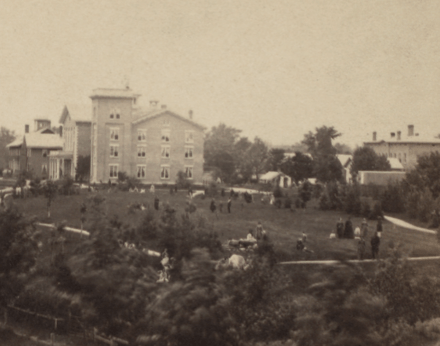1880s
Today in Labor History September 1, 1880: The utopian communistic Oneida Community ended after 32 years. John Humphrey Noyes founded the community in 1848 near Oneida, New York. They believed that Jesus had already returned in AD 70, allowing them to bring about Jesus’s millennial kingdom themselves. The Community practiced communalism (holding all property and possessions in common). They also practiced complex marriage, where 3 or more people could enter into the same marriage. And they practiced male sexual continence, where the goal was to not ejaculate during sex. They were also one of the first groups in the U.S. to practice mutual criticism. The objective here was to root out bad characteristics in people. Many later cults adopted similar methods. Even the UFW, under the leadership of Cesar Chavez, did something like this.
Numerous authors have portrayed the Oneida Community in fiction such as “Silken Strands,” by Rebecca May Hope (2019). “Assassination Vacation,” by Sarah Vowell (2005) and “Pagan House,” by David Flusfeder (2007).
Today in Labor History September 1, 1903: 30,000 working women from 26 trades marched in Chicago’s Labor Day parade.
1900s
Today in Labor History September 1, 1907: Walter Reuther was born. Reuther was president of the United Auto Workers from 1946 until his death in 1970 under suspicious circumstances. He was also president of the Congress of Industrial Organizations (CIO) prior to its merger with the American Federation of Labor (AFL). Reuther was a supporter of political action and said that “There’s a direct relationship between the breadbox and the ballot box, and what the union fights for and wins at the bargaining table can be taken away in the legislative halls.”
1930s-1950s
Today in Labor History September 1, 1934: A strike began in Woonsocket, Rhode Island, as part of a national movement to obtain a minimum wage for textile workers. The strike lasted until September 23, and involved more than 420,000 workers, with three of them being killed in the actions.
Today in Writing History September 1, 1952: The Old Man and the Sea was first published. Ernest Hemingway won the Pulitzer Prize for this novel.
1980s
Today in Labor History September 1, 1987: During a nonviolent protest against the illegal U.S arming of the Nicaraguan Contras, a Navy munitions train ran over anti-war protester Brian Willson, who lost both legs in the incident. But Willson continued to be an active leader in the anti-military movement. The following day, activists dismantled the train tracks in protest. Wilson was later sued by civilian members of the train crew for the “humiliation, embarrassment & emotional distress” the incident caused them. All of this occurred at the Concord Naval Weapons Station, just east of San Francisco, formerly known as Port Chicago. It was the same site where an explosion killed 322 mostly black sailors during WWII, setting off a rebellion known as the Port Chicago Mutiny.



